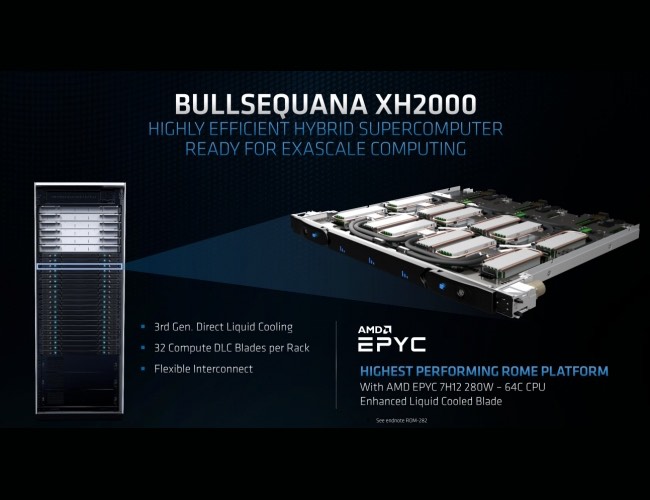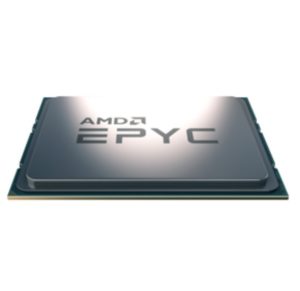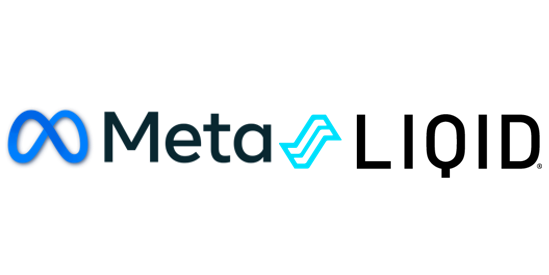 Today AMD announced a new addition to the 2nd Generation AMD EPYC family, the AMD EPYC 7H12 processor. The 64 core/128 thread, 2.6Ghz base frequency, 3.3Ghz max boost frequency, 280W TDP processor is specifically built for HPC customers and workloads, using liquid cooling to deliver leadership supercomputing performance.
Today AMD announced a new addition to the 2nd Generation AMD EPYC family, the AMD EPYC 7H12 processor. The 64 core/128 thread, 2.6Ghz base frequency, 3.3Ghz max boost frequency, 280W TDP processor is specifically built for HPC customers and workloads, using liquid cooling to deliver leadership supercomputing performance.
In an ATOS testing on their BullSequana XH2000, the new AMD EPYC 7H12 processor has set four new world-records in server performance. With a LINPACK score of ~ 4.2 TeraFLOPS, the new chip performs ~11% better than the AMD EPYC 7742 processor.
Thanks to the BullSequana’s Enhanced Direct Liquid Cooling system and the powerful AMD EPYC 7H12 processor, the Atos measurements currently top the best published results for two-socket nodes on four SPECrate benchmarks. Additionally it has set a new record for the HPL Linpack Benchmark on an AMD EPYC CPU, with an 11% increase in performance.** These measure how hardware systems perform under compute-intensive workloads based on real-world applications. The BullSequana surpasses previous records*** (records using both AMD and non-AMD processors) for all 5 benchmarks.
The BullSequana XH2000’s enhanced DLC (Direct Liquid Cooling) was essential in enabling the AMD’s 280W EPYC 7H12 processor to reach its maximum level of performance. The results showed an unprecedented performance for BullSequana’s lowest power consumption. Power efficiency is a key priority for large data centers when it comes to selecting a supercomputer, as it translates into an optimal TCO (Total Cost of Ownership) enabling millions to be saved over the project lifespan.
We’re extremely proud that our BullSequana has achieved these world-record results. Our unique Enhanced Direct Liquid Cooling system provided the most efficient environment for achieving such performance of the AMD EPYC processor,” said Agnès Boudot, Senior Vice President, Head of HPC & Quantum at Atos. “Our BullSequana equipped with the latest AMD chip, provides our customers with the highest available performance for HPC and AI workloads, with an optimized TCO, to support them in going beyond the limits of traditional simulation.”
Several clients worldwide have already selected the BullSequana supercomputer powered with an AMD EPYC processors for an enhanced computing capacity to supercharge their workloads. This includes French national high-performance computing organization GENCI, CSC in Finland, Uninett Sigma2 in Norway, and a major European weather forecast center and an American multi-national consumer goods giant.
 At an AMD event in Rome this week, the company also highlighted highlighted the growing adoption of 2nd Gen AMD EPYC processors across cloud, enterprise, and HPC customers.
At an AMD event in Rome this week, the company also highlighted highlighted the growing adoption of 2nd Gen AMD EPYC processors across cloud, enterprise, and HPC customers.
- Dell Technologies announced five new Dell EMC PowerEdge platforms powered by the 2nd Gen AMD EPYC processor. These platforms were designed from the ground up and optimized to support the features of the new AMD EPYC processor including PCIe® 4.0.
- IBM Cloud detailed how 2nd Gen EPYC processors can support IBM Cloud customer needs in specific areas including helping improve cloud security, better memory bandwidth for big data and analytics workloads and core scaling and breakthrough performance for container workloads. IBM plans to have more to share in 2020 about its performance offerings for clients.
- Nokia highlighted how 2nd Gen EPYC processors significantly accelerate its Cloud Packet Core system which helps service providers deliver converged broadband, IoT, and machine-type communication services for 5G. In testing, Nokia found its Cloud Packet Core system with 2nd Gen AMD EPYC provided a 2X increase in packet throughput compared to previous systems2.
- OVHcloud, a global cloud provider specializing in delivering industry-leading performance and cost-effective solutions, announced a new high-end hosting instance based on the AMD EPYC 7402P processor. This instance will be available at the end of 2019.
- TSMC announced its adoption of 2nd Gen AMD EPYC helping power its next generation research and leading process technology.
Sign up for our insideHPC Newsletter



